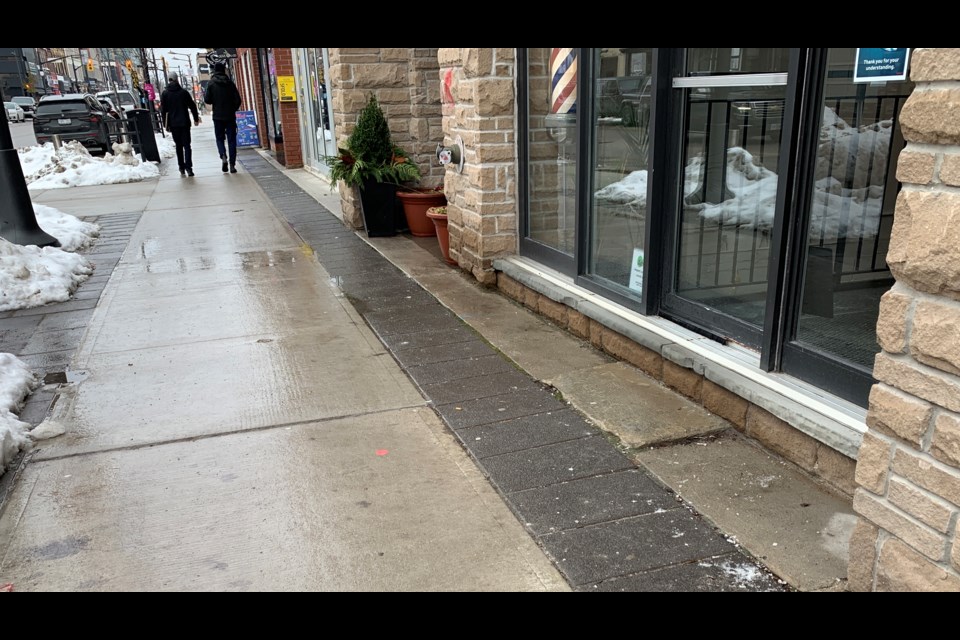Getting around Barrie isn’t always easy for residents with mobility issues, and at least one local resident is hoping to see a change, sooner rather than later.
Gidget Hebert, 49, is a “part-time” wheelchair user, and told BarrieToday that while she’s aware city officials and the Downtown BIA are pushing for the renovation of businesses in the downtown core to make them accessible and inclusive, it just isn’t happening fast enough.
“Unfortunately, until those businesses make changes, shopping downtown is close to impossible for anyone in a wheelchair. Pretty much every building down there has some sort of step in front of it,” she said. “When you talk about including everyone in Barrie, it’s hard to do that if half the town isn’t accessible to a part of the people who live here.”
The issue goes beyond just the downtown core, she says, pointing out a large portion of businesses located in “strip malls” along Bayfield Street are also not accessible.
“There’s no way to even get to the door let alone get inside,” Hebert said, noting many of the buildings in the city are covered under a “grandfather clause” and are not required to change anything about the building to accommodate for accessibility, unless they are conducting renovations.
“A lot of the buildings around here (fall under) that clause because they’ve been around for long enough," she said.
Cheryl Dillon, the city's disability management and accessibility specialist, told BarrieToday the Accessibility Advisory Committee’s (AAC) mandate is to ensure municipal compliance with the Accessibility for Ontarians with Disabilities Act (AODA) legislation, but noted the mandate does not touch on private businesses of any kind.
“The corporation and the AAC do not have any authority to 'require' businesses to become more accessible. However, the AAC is always interested in encouraging the community to make accessibility improvements where possible,” she said, adding they frequently engage with businesses and various business groups in Barrie to create greater awareness of accessibility and how accessibility can benefit businesses.
The clause is not something the city has put in place, but rather something that exists within the province’s Accessibility for Ontarians with Disabilities Act (AODA) as well as the Provincial Ontario Building Code, and accessibility requirements under the Ontario Building Code only apply to new construction, explained Dillon.
“The standards only apply to new construction and renovated existing public spaces,” she said. “They also apply if an existing building has plans for extensive renovations. While the city enforces the building code, the municipality is not able to enforce greater requirements for accessibility than those outlined in the Ontario Building Code.”
Sergio Morales, who is chair of the Downtown Barrie Business Improvement Association (BIA), told BarrieToday when the organization finds out property owners are doing renovations, they try to highlight not only the social and accessibility benefits to the community, but also economic benefits in doing so, he said.
"When buildings are more accessible, you're increasing your customer base and sending a message you're an inclusive business property owner that's open for everybody," said the city councillor. "We really try to hammer that point when we find out.
"We obviously don't always have direct contact when property owners are doing renovations, but that is definitely something that's always on our mind," Morales added.
In a post-COVID world, Morales says the BIA wants doors to be open and for people to be supporting downtown businesses.
"For door to be open they need to be accessible," he said.
While the city’s transit system does include specialized transit — a door-to-door, shared-ride accessible public transit service — it’s currently been redeployed to get those individuals to and from vaccination appointments, meaning it’s unavailable to book for regular use. Regular transit buses, while they do have ramps, also isn’t always a viable option, Hebert said.
“A lot of times you are hit and miss on whether the ramp works, or in the winter, (the driver) can’t even find a spot to put the ramp out because they don’t quite clean the roads well enough. … So unless you have a vehicle or take the (regular) bus you don’t get anywhere, and (most) of the taxis here have one (that) you have to book (it) weeks ahead of time," she said.
While her concerns may seem to be a “lot of little things,” Hebert says they are ones that can add up quickly for anyone with mobility issues.
“It’s great to talk about accessibility and inclusivity, but if it’s going to take 10 or 20 years to do anything, it makes it kind of tough," she said.
As a whole, Hebert says she’d like to see the city and local businesses have a bit more of an understanding of the situation residents with mobility issues face.
“I do understand it’s tough to get some of that stuff included, but at the same time, when someone says they have an issue, telling them 'we’re working on it' and that it’s going to be another 10 years before they do anything… that’s just a kick in the face and (they’re) basically telling us that we are not worth it,” she said.
“Some of these stores it would be easy enough to fix it with one of those $100 rubber ramps that you can get to go in the doorway," Hebert added. "It’s that simple. To turn around and tell someone who is in a wheelchair that it’s too expensive… our disability is an inconvenience to them? Yes, it is, but it’s an even bigger inconvenience to us.”
Dillon says any local businesses looking on how to make their business more accessible should look at The Business of Accessibility Handbook: How to Make Your Main Street Business Accessibility Smart, which offers no-cost and low-cost ideas, gathered from people with first-hand experience, to inspire businesses to go beyond the minimum requirements of the AODA.



